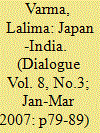| Srl | Item |
| 1 |
ID:
077220


|
|
|
|
|
| Publication |
2007.
|
| Summary/Abstract |
Growing Japanese Nationalism' has become a subject of intense debate during the last one decade, in particular after revision of the history textbooks, formal recognition of the 'Kimigayo' anthem which reminds one of Japanese militaristic past, and initiatives taken by the Japanese Government to amend the pacifist Constitution. An attempt is made in this study to compare Japanese nationalism prevalent in the pre-World War II period and the type of nationalism emerging in Japan in recent years. Both the nationalisms are qualitatively different. 'Aggressive and militant' nationalism of the pre-World War II period was a response to the environment existing during that period when a large part of the world was colonised by the advanced western countries including China, where each power had its interests and own spheres of influence. Meiji leaders were determined that their country should not suffer the same fate as their neighbour. It was with this objective that the Japanese leadership sought to instil nationalism in the minds of the common people so as extract maximum devotion and support from them for their expansionist foreign policy. On the other hand today nationalism in Japan is basically geared towards seeing that it occupies an important position in world affairs which are commensurate with its being the second largest economy and a major contributor to multilateral organisations such as the United Nations (UN) and a major provider of developmental aid and foreign direct investments (FDI). In simple words it wants to be a 'normal' country and not just a follower of the US. It is unlikely that Japanese nationalism will tread the militaristic path as in the pre-War period. This is mainly because the international and the regional environment which exists today is drastically different from the pre-War period. China is no more a weak power and other developing countries which were colonised are emerging powers. Moreover, a peaceful environment is necessary for its economy to prosper. Besides democracy has come to stay in Japan and there are equally assertive groups which strongly oppose any stand taken by the government which may lead to the revival of militarism in Japan
|
|
|
|
|
|
|
|
|
|
|
|
|
|
|
|
| 2 |
ID:
077834


|
|
|
| 3 |
ID:
068864


|
|
|
| 4 |
ID:
001820


|
|
|
|
|
| Publication |
New Delhi, Lancer's Books, 2000.
|
| Description |
xx,555p.
|
| Standard Number |
8170950775
|
|
|
|
|
|
|
|
|
|
|
|
Copies: C:1/I:0,R:0,Q:0
Circulation
| Accession# | Call# | Current Location | Status | Policy | Location |
| 042968 | 327.52054/KES 042968 | Main | On Shelf | General | |
|
|
|
|